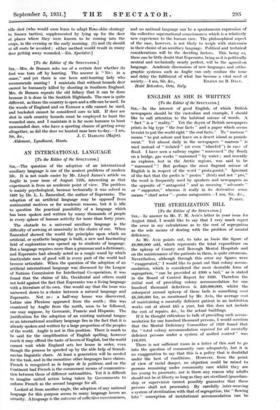AN INTERNATIONAL LANGUAGE
[To the Editor of the SPECTATOR.] SIR,—The question of the adoption of an international auxiliary language is one of the acutest problems of modern life. It is not made easier by Mr. Lloyd James's article on Anglic in your issue of August 15th, interesting as that experiment is from an academic point of view. The problem is mainly psychological, because technically it was solved in 1887 by Dr. L. L. Zamenhof, the author of Esperanto. The adoption of an artificial language may be opposed from sentimental motives or for academic reasons, but it is idle to question the practical possibility of a language which has been spoken and written by many thousands of people in every sphere of human activity for more than forty years.
The obstacle to a universal auxiliary language is the difficulty of arriving at unanimity in the choice of one. When Zamenhof showed the world the principles upon which an artificial, or synthetic language is built, a new and fascinating field of exploration was opened up to students of language. But a language requires more than a grammar and a dictionary, and Esperanto had already acted as a magic wand by which inarticulate men of good will in every part of the world had become articulate. When the question of the adoption of an artificial international language was discussed by the League of Nations Commission for Intellectual Co-operation, it was found that the claims of Ido, Occidental and others could not hold against the fact that Esperanto was a living language with a literature of its own. One would say that the issue was narrowed down to a choice between a natural language and Esperanto. Not so : a half-way house was discovered. Latine sine Flexione appeared from the south ; this was countered by Anglic from the north, soon to be followed, one may suppose, by Germanic, Francic and Hispanic. The justification for the adoption of an existing national tongue as an international auxiliary language lies in the fact that it is already spoken and written by a large proportion of the peoples of the world. Anglic is not in this position. There is much to be said. for the simplification of English spelling, however much it may offend the taste of lovers of English, but the world cannot wait while England sets her house in order, even though the process be speeded up by the able help of Scandi- navian linguistic chars. At least a generation will be needed for the task, and in the meantime other languages have claims. French is recognized as la longue de in politesse, and on the Continent bad French is the commonest means of communica- tion between those of different nationalities. Yet it is difficult to imagine united action being taken by Governments to enforce French as the second language for all.
Looked at from another angle, the adoption of any national language for this purpose seems to many language lovers an atrocity. A language is the outcome of collective consciousness, and no national language can be a spontaneous expression of the collective supernational consciousness which is a relatively new experience to the human race. The philosophical aspect of the case, however, is not likely to weigh with statesmen in their choice of an auxiliary language. Political and technical considerations will be the deciding factors. This being so, there can be little doubt that Esperanto, being as it is politically neutral and technically nearly perfect, will be the agreed-on language. Academic discussions of new languages and ortho- graphic systems such as Anglic can only confuse the issue and delay the fulfilment of what has become a vital need of






























 Previous page
Previous page